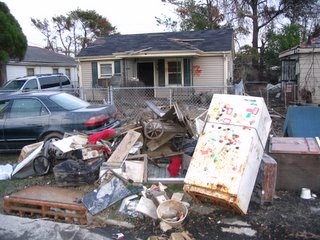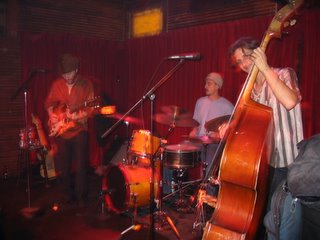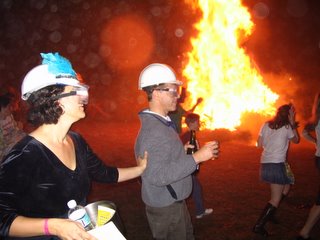 Now, lest my mother read this and begin to worry that I am showing symptoms of those addictive D__-genes in my family, let me say that I am not an alcoholic (seriously, I mean it,) and that, all things considered, a little bit of the blues is to be expected. I wouldn’t call it, “Wigging Out,” as this article does, but one does get the feeling that one has gone a tiny bit crazy when one lives in a Post-Katrina New Orleans.
Now, lest my mother read this and begin to worry that I am showing symptoms of those addictive D__-genes in my family, let me say that I am not an alcoholic (seriously, I mean it,) and that, all things considered, a little bit of the blues is to be expected. I wouldn’t call it, “Wigging Out,” as this article does, but one does get the feeling that one has gone a tiny bit crazy when one lives in a Post-Katrina New Orleans.Luckily we are in our home, which, while mostly undamaged, does appear to have taken some water, which I discovered while cleaning behind the toilet in our bathroom. A strange brownish-gray film, much like the one that covers, well, everything, in other neighborhoods of NOLA, covered the back corner of the toilet’s pedestal. I wiped it, and, uh, smelled it, and it had that unmistakable and indescribable odor that has become so familiar. Upon closer inspection, I discovered a brown line, almost the color of a tea stain, along the baseboard. It wasn’t the same kind of watermark that you see all over New Orleans, and I don’t think the water stayed in the bathroom or kitchen, but it appears that when the levees first broke, the water did, in fact, at least leak into our kitchen and bathroom. I will need to tell our landlords about this, but decided to wait until after the holiday, primarily because it seemed an exhausting task, at the time, to tell them that the house did, in fact, receive damage, and now, well, it seems no less exhausting.
I guess that’s the thing: everything makes me tired. Even talking to our dear neighborhood friend, Terence, who has been living in an apartment in Houston with his mother and brother, who has no young friends to play with, who doesn’t know what will happen next, and who asks me whenever we talk if I’ve talked to his friend, Jabari, whom I haven’t seen since the storm, or his neighbor, Miss Theresa, whom I also haven’t seen since before the storm—even talking to Terence feels like a chore. A family friend of theirs who attended church with them has been in contact with us about finding a place for them to live. Libba says we are “saving Terence’s life,” by helping them, but we have found only one landlord willing to deal with Section 8, and that home, too, is really too expensive for a single mother working in a bakery to afford.
I told my mother when I was back in Atlanta for the holiday that to me the hardest bit is not having a concentrated place to focus my grief. It is not just the survivor’s guilt that gets me, but the mental exhaustion that comes with feeling the collective grief of everyone else—of people who lost everything, of children like Terence who spent Christmas in a strange place and undoubtedly with very little cheer. Those who lost their homes can mourn that loss, but for those of us who still have (in the technical sense) everything, we don’t know what to mourn; we mourn everything. Oh, my word, it sucks.

But here’s what sucks even more:
While we were at the annual Christmas Eve party thrown by family friends in Atlanta, a couple I’d never met before asked about New Orleans. What was it like to be back, they wanted to know. What were our plans for the future? These are not easy questions to answer, and they are even more difficult to answer when it turns out that your audience thinks that New Orleans shouldn’t be rebuilt, or at least “not with my tax dollars.” I wanted to say how I felt the same way about the war in Iraq, but something—was it my being gracious or cowardly—made me bite my tongue. I did speak up when Mrs. So-and-conservative-so took on the tone of Barbara Bush. “Those people,” she said, didn’t own their homes in the first place, and “they” were better off starting new lives elsewhere.
“Actually,” I said, “seventy-five percent of ‘those people’ in the lower ninth ward owned their homes—a far greater percentage than in other neighborhoods of New Orleans.”
“Oh, really?” said she, not looking at me (did she ever look at me? Was she afraid, perhaps, that doing so might require that she show a bit of empathy?)
I excused myself.
I wound up showing a slide show while reading the “Night Before Christmas” that my friend and colleague, Stephany Lyman wrote. It made me and those who had hearts (i.e. everyone except the bitch who sat with me at dinner) cry. I cried, too, while the Prayers of the People were read at the church I attended as a child. Someone mentioned “those who have suffered loss from natural disaster,” and oh, how my floodgates a-let loose!
After being spoiled by my parents and a night of bowling with friends, Simon and I headed back to New Orleans for the New Year. Jeremy Lyons and Greg Schatz were in town, and it was great to talk to them and to sing with Schatzy on New Year’s Eve. Both Greg and Jeremy talked about wanting to come back, but for the time being they are where they are. Jeremy, his wife Valerie, and their daughter, Lucy, are living outside of Boston. The home they rented in Mid-City was flooded and they are waiting to see what will happen next. Jeremy said that he had always thought that he was one of the more conservative New Orleanians, but that everywhere else he goes, no matter how left-wing or liberal, he just feels different, somehow. Greg said a bit of the same and talked about his reluctant residency in New York. I was glad to talk to musicians who felt an innate loyalty to New Orleans, as I do.

After the Schatzy gig at d.b.a, we went to the bonfires on the levee in Mid-City—an event that has occurred for decades, as I understand it, and we added our dried-up Christmas Tree to the pile that was ignited at midnight. The police and fireman presence was huge, but they let us be until the trees burnt themselves out, and I watched as friends ran in circles around the fire, gleefully, with abandon. The fire and policemen, even, seemed to be having a good time. There were kids there, too, and fireworks and sparklers and lots of fog—our Southern snow—that made the atmosphere even more, uh, magical. It was good, then, to be home.


No comments:
Post a Comment